Were the emails inserted, planted by Charles McGonigal into the Abedin-Weiner laptop while he had the unique access to it? - Selected Articles
Michael Novakhov's favorite articles - 7:25 AM 2/16/2023
Were the emails inserted, planted by Charles McGonigal into the Abedin-Weiner laptop while he had the unique access to it? What was the role of James Kallstrom and his gang, within and out of the FBI, which he controlled like a Mafia Boss?
#Kallstrom The #Boss in turn reported to the Capo De Tutti Capi: Donald #Trump. They used to talk weekly, he said. And how is that for a company? It got him the #Presidency of the US.
2:13 AM 2/16/2023 My Opinion – The News And Times https://t.co/zwRK9pgHVp
2:13 AM 2/16/2023 My Opinion – The News And Times https://t.co/zwRK9pgHVp
Did Charles McGonigal & James Kallstrom plant the Clinton emails into Abedin-Weiner laptop? Did they orchestrate the October Surprise by doing this and fix the Election 2016 for Trump? INVESTIGATE THE INVESTIGATORS! | Tweets - The News And Times https://t.co/T8CxfQA5XW
2:13 AM 2/16/2023
My Opinion – The News And Times
- Tweets - 6:40 PM 2/15/2023 | #FBi-FBI: Investigate the #Weinergate: Were the emails inserted, planted by Charles McGonigal into the Abedin-Weiner laptop while he had the unique access to it? What was the role of James Kallstrom in this operation?February 15, 2023
- Did Kallstrom and McGonigal fix the Election 2016 for Trump? Who and HOW inserted Clinton's emails into the Abedin-Weiner's laptop?February 12, 2023
- The central, complex and enigmatic figure of The Great October 2016 Surprise is James Kallstrom, who saw himself as the actual Director, opposed to the Obama-Comey #FBI. His personality and mechanisms of his powers have to be studied and investigated. Publish ALL his FBI records!February 7, 2023

Former FBI Special Agent Nicole Parker testified to a House panel investigating the “weaponization” of the federal government that the bureau is plagued by “low morale,” has become “politically weaponized,” and has lowered its standards for new agents.
Parker’s emotional testimony Thursday highlighted the first hearing by the new House Judiciary Committee’s Select Subcommittee on the Weaponization of the Federal Government.
“Over the course of my 12-plus years of service, the FBI’s trajectory transformed,” said Parker.
“The FBI became politically weaponized, starting from the top in Washington [and] trickling down to the field offices,” she alleged, saying that it felt “as if there became two FBIs.”
Parker, who worked out of the FBI’s Miami field office, resigned from the bureau last year and publicly announced that she had left in an op-ed for Fox News last month, from which she borrowed much of her testimony on Thursday.
In the op-ed, Parker claimed the bureau has been troubled by “one politicization issue after another,” citing the case of agents in FBI vests who knelt with Black Lives Matter protesters in Washington following the murder of George Floyd by Minneapolis police officer Derek Chauvin.
“Although agents have their First Amendment rights, they are not at liberty to publicly express any potential political support while on duty wearing official FBI gear,” Parker wrote, adding that it was “appalling” that the agents were not even reprimanded.
 Former FBI agent Nicole Parker testified that the bureau has been “politically weaponized” during a House Judiciary subcommittee hearing on February 9, 2023.AP Photo/Carolyn Kaster
Former FBI agent Nicole Parker testified that the bureau has been “politically weaponized” during a House Judiciary subcommittee hearing on February 9, 2023.AP Photo/Carolyn Kaster  Parker wiping away tears during her testimony.REUTERS/Evelyn Hockstein
Parker wiping away tears during her testimony.REUTERS/Evelyn HocksteinIn her testimony, Parker further alleged that “there has also been a shift in recruiting practices – a lowering of the eligibility requirements – which is negatively impacting the agency’s performance.”
“All this adds up to a loss of trust in the FBI by many Americans and low morale among many FBI employees,” Parker said.
The FBI told The Post on Thursday that bureau employees “are expected to uphold the highest standards.”
“FBI employees carry out their duties in accordance with the law and are expected to uphold the highest standards. Our work is critical in protecting the American people from a variety of threats and in upholding their constitutional rights,” the FBI said in a statement.
 Parker getting sworn in with Raben Group principal Elliot Williams and George Washington University Law Center Professor Jonathan Turley. Getty Images
Parker getting sworn in with Raben Group principal Elliot Williams and George Washington University Law Center Professor Jonathan Turley. Getty Images Parker said the FBI “transformed” over the course of her 12 years of service. Photo by Chip Somodevilla/Getty Images
Parker said the FBI “transformed” over the course of her 12 years of service. Photo by Chip Somodevilla/Getty Images Parker speaking with former FBI agent Thomas Baker at the hearing. Photo by Chip Somodevilla/Getty Images
Parker speaking with former FBI agent Thomas Baker at the hearing. Photo by Chip Somodevilla/Getty ImagesIn January, the House voted to establish the “weaponization” subcommittee on a straight party-line vote.
The panel will investigate how the federal government and private companies collect and analyze information on Americans, as well as other civil liberties issues, according to the resolution establishing it.
The subcommittee is chaired by Rep. Jim Jordan (R-Ohio), a longtime critic of the FBI and the Justice Department who has accused the agencies of targeting conservatives.

The former FBI official busted Monday for allegedly taking illegal foreign payments played a key role in the bureau’s controversial “Russiagate” probe of former President Donald Trump — and a “defensive briefing” of ex-rival Hillary Clinton’s lawyers.
Charles “Charlie” McGonigal, 54, was among the first FBI officials to learn that Trump campaign adviser George Papadopoulos told an Australian diplomat that Russia had “political dirt” on Clinton.
FBI Deputy Assistant Director Jonathan Moffa told Senate Judiciary Committee staffers in 2020 that he got a July 2016 email from McGonigal which “contained essentially that reporting, which then served as the basis for the opening of the case.”
The FBI investigation, dubbed “Crossfire Hurricane,” led to the appointment of special counsel Robert Mueller and a 22-month, $32 million probe of Russian meddling in the 2016 election and potential ties to associates of Trump, now 76.
Shortly before Mueller was appointed, McGonigal also sent a message to an FBI colleague that discussed how agents were interviewing another Trump campaign adviser, Carter Page.
“Our Team is currently talking to CP re Russia,” McGonigal wrote on March 16, 2017, according to Justice Department records released by Senate Republicans.
 The 54-year-old was one of the first FBI officials to learn about a Trump adviser saying Russia had “political dirt” on Clinton. AP
The 54-year-old was one of the first FBI officials to learn about a Trump adviser saying Russia had “political dirt” on Clinton. AP Mueller was appointed to lead the probe. Mandel Ngan/AFP via Getty Images
Mueller was appointed to lead the probe. Mandel Ngan/AFP via Getty Images Clinton ran against Trump during the 2016 presidential election. Chip Somodevilla/Getty Images
Clinton ran against Trump during the 2016 presidential election. Chip Somodevilla/Getty ImagesAt the time, McGonigal had recently been promoted to special agent in charge of the FBI’s New York Counterintelligence Division after serving as chief of the Cyber-Counterintelligence Coordination Section in Washington, DC.
Page was wiretapped by the FBI in 2016 based on an application under the Foreign Intelligence Surveillance Act that asserted he “has been the subject of targeted recruitment by the Russian government” — a claim Page has denied.
The application — which also cited claims from the discredited anti-Trump “Steele dossier” — was granted and renewed three times, leading the Justice Department’s inspector general to issue a scathing 2019 report that called it a “clear abuse of the FISA process.”
In 2020, former FBI lawyer Kevin Clinesmith pleaded guilty to falsifying an email tied to the final FISA application to monitor Page and was sentenced to one year of probation.
McGonigal’s name is also first on a list of FBI officials who received an Oct. 22, 2015, memo about a “classified defensive briefing” given to lawyers for Clinton’s presidential campaign about attempts by an unidentified foreign government to influence the candidate through “lobbying efforts and campaign contributions.”
 McGonigal served as a special agent in charge of the FBI’s New York Counterintelligence Division. Stefan Jeremiah for NY Post
McGonigal served as a special agent in charge of the FBI’s New York Counterintelligence Division. Stefan Jeremiah for NY Post McGonigal originally joined the FBI back in 1996. Stefan Jeremiah for NY Post
McGonigal originally joined the FBI back in 1996. Stefan Jeremiah for NY Post Papadopoulos told a diplomat that Russia had “dirt” on Hillary Clinton. REUTERS/Carlo Allegri/File Photo
Papadopoulos told a diplomat that Russia had “dirt” on Hillary Clinton. REUTERS/Carlo Allegri/File PhotoThat document was made public in 2020 by then-Senate Judiciary Chairman Lindsey Graham (R-SC), who said it showed “a clear double standard by the Department of Justice and FBI when it came to the Trump and Clinton campaigns in 2016.”
“When it came to the Trump campaign, there were four counterintelligence investigations opened against Trump campaign associates,” Graham said at the time. “Not one time was President Trump defensively briefed about the FBI’s concerns.”
In his 2019 report, Mueller wrote that his investigation “did not establish that members of the Trump Campaign conspired or coordinated with the Russian government in its election interference activities.”
But the report also outlined 11 potential instances of obstruction by Trump, who Mueller testified in 2019 “was not exculpated for the acts that he allegedly committed.”

A former senior Soviet Foreign Ministry official in the U.S. filed as a Foreign Agent for a top aide to Russian billionaire Oleg Deripaska, who has been described by the U.S. Senate as a key figure in the Kremlin’s malign influence operations.
The paperwork filed under the Foreign Agent Registration Act (FARA) has raised numerous concerns from experts who have noted that the aide, Yevgenyi (Evgeny, Evgeniy) Fokin, has reportedly been flagged by the FBI as a former senior Russian intelligence official.
In addition, the filing raises questions about the involvement of a former senior FBI counterintelligence official who reportedly connected Fokin to a law firm and business intelligence consultants.
The FARA filing was first publicly spotted by Wendy Siegelman, an independent investigative journalist.
Forensic News believes in transparency in the journalism process. Go behind-the-scenes to see how this story was created with the Stone video bibliography:
The Foreign Agent filing
On Nov. 29, 2021, Sergey Shestakov, the former Soviet diplomat, registered as a Foreign Agent for Fokin, the alleged former senior Russian intelligence official.
Though the filing is scarce on details, Shestakov stated that he enlisted Charles F. McGonigal, the FBI’s former top counterintelligence official in New York, to connect Fokin to the law firm Kobre & Kim as well as “business intelligence consultants” Spectrum Risk Solutions.
“Mr. Fokin has contacted me seeking professional assistance in the US, which have resulted in the retention of the law firm of Kobre & Kim and later and separately the business intelligence consultants Spectrum Risk Solutions,” Shestakov stated. “I acted in hope that my assistance would result in a facilitation fee from the US entities retained, and I have received such fees.”
In an amendment filed two days after this article, Shestakov stated that he did not receive funds from Fokin, but rather got paid by Kobre & Kim and the “investigative firm,” Spectrum Risk Solutions.
“I received no monies from the foreign principal. However, on 11/27/19 I received a one-time payment of $25,000 from the law firm and on 10/18/21 I received a payment of $8,000 from the investigative firm, both referred to in the original filing,” Shestakov said. He also stated that his “activities on behalf of” Fokin have ceased.

Network diagram of the connections of those involved in the FARA filing.
Fokin now acts as the director of international cooperation for En+ Group, an energy conglomerate founded by Oleg Deripaska. A 2019 deal to remove En+ Group from U.S. sanctions stipulated that Deripaska must reduce his holdings in the group to under 50%, though he reportedly transferred some shares to family members and another group under his control.
In October, the FBI raided residences in Washington, D.C. and New York owned by people close to Deripaska in an unspecified criminal investigation. Information about what prompted the dramatic hours-long raids remains unclear.
Shestakov reported that the activity involving Fokin and McGonigal began over two-and-a-half years ago. FARA laws mandate that Foreign Agents, “must file a registration statement within 10 days of having agreed to act as an agent of a foreign principal.”
Anna Massoglia, a researcher at the Center for Responsive Politics and an expert on FARA, told Forensic News that the timing of the filing is notable, given the recent law enforcement activity at the Deripaska-connected houses.
“The timing of the filing is certainly noteworthy since it comes so long after the activities reportedly took place and so shortly after the FBI searched property linked to Deripaska,” she said.
Massoglia also stated that “the descriptions of the Deripaska ‘presumably’ supervising, directing, and controlling [En+] are particularly striking.” “This provides some corroboration for reports that Deripaska has retained significant influence over the companies’ operations,” despite the U.S. sanctions, Massoglia said.

Excerpt from the FARA filing
Shestakov acted with the assistance of McGonigal, he reported, in connecting Fokin with Spectrum Risk Solutions, a business intelligence firm, and Kobre & Kim, a law firm.
In a statement to Forensic News, however, a Kobre & Kim spokesperson said that the firm “conducted no work covered by FARA for Yevgenyi Fokin or En+.” The spokesperson did not elaborate on why Kobre & Kim appeared on the FARA paperwork. Legal work can be exempt under FARA, according to Massoglia.
The only company Forensic News was able to identify by the name “Spectrum Risk Solutions” in the U.S. was incorporated in Delaware in 2018, according to OpenCorporates. Forensic News acquired the single document filed for Spectrum Risk Solutions in the corporate-secrecy haven of Delaware, but it did not give any indication of who is behind the company or what work it does.
Background on Fokin, Shestakov, and McGonigal
Forensic News used a combination of corporate documents, property deeds, open-source research, and interviews with people familiar with the situation to confirm that the Shestakov in the FARA filing is the former Soviet diplomat.
The property records for Shestakov’s residence in Connecticut listed on the FARA documents show that the United Nations issued his mortgages, a rare benefit that only those with a direct relationship with the UN enjoy.

Property records for Shestakov’s residence showing UN mortgage
A background check on Shestakov revealed that he used at least two email addresses connected to the Russian-language networks RTVI and Media-Most and he appears on the corporate documents for companies related to the media groups.
That background information largely confirms a 2010 interview in which Shestakov is introduced as “a former Soviet Foreign Ministry official…and Vice President of the global Russian television network RTVI.” A second interview describes him as the Chief of Staff to former Soviet Ambassador to the UN, Alexander Belonogov. That account is corroborated by author Sharon Leontine Wallenberg.
Yana Agoureev, a relative of Shestakov’s who appears on the property deed for the Connecticut residence is a Russian interpreter who has acted on behalf of multiple high-profile Russian criminals. Her client list included Evgeny Buryakov, an SVR official convicted of espionage in New York, and Alexander Zhukov, a self-described “king of fraud.”
On Facebook, Agoureev is friends with Anatoli Samochornov, an interpreter who was present at the 2016 Trump Tower meeting with Donald Trump Jr, Paul Manafort, Jared Kushner, and other Russians who promised “dirt” on Hillary Clinton.
Shestakov did not respond to a detailed list of questions regarding the FARA paperwork and the persons involved.
The alleged former Russian intelligence officer
The foreign principal for whom Shestakov acted as an agent, Yevgenyi Fokin, is considered one of just a handful of individuals in Oleg Deripaska’s inner circle.
The Telegraph reported in 2018 that, “FBI officers identified Evgeny Fokin, who is the company’s Director of International Cooperation, as formerly being the SVR’s declared liaison officer with U.S. intelligence agencies in Washington DC in the mid-1990s.”
An Intelligence Online report added more details, stating that Deripaska “discreetly” turned to Fokin to help remove sanctions against En+. “Fokin, a former high-ranking officer with the SVR, is a keen strategist who knows the US authorities well, having been stationed in San Francisco and Washington several times between 1989 and 1995,” Intelligence Online reported. That timeline indicates that Fokin and Shestakov concurrently held high-level Soviet political positions.
Fokin has denied that he was previously employed by Russia’s foreign intelligence service, the SVR, but he did not respond to a detailed list of questions sent by Forensic News.
The 2019 activity described by Shestakov came as the Senate investigated Russian interference in the 2016 U.S. election. In that investigation, Fokin became a subject of interest because of his proximity to Deripaska and others suspected of interfering in the election, according to two sources familiar with the probe.
In 2016, Trump campaign chairman Paul Manafort met multiple times with a suspected Russian intelligence agent close to Deripaska and, along with campaign co-chair Rick Gates, shared internal, detailed polling information regarding the campaign. Five years later, the U.S. Treasury Department said that the “sensitive information on polling and campaign strategy” was passed to Russia’s intelligence services.
The former senior FBI official
According to the FARA filing, Shestakov turned to Charles F. McGonigal, a former senior FBI official who left the Bureau just months prior to the filing. McGonigal became the Special Agent in Charge of Counterintelligence for the New York Office in 2016 and left in the fall of 2018, just months before he allegedly helped connect Fokin with the law firm and the opaque Spectrum Risk Solutions.
McGonigal spent 22 years with the FBI according to an official biography after starting his career investigating Russian counterintelligence matters. He led numerous high-profile cases for the FBI, including insider-espionage investigations and the 2010 criminal probe of WikiLeaks.
Shestakov stated that Fokin corresponded with him “on behalf of himself and/or his company” but the information filed by Shestakov did not stipulate whether McGonigal assisted Fokin on behalf of En+ or in a personal capacity.
McGonigal did not respond to messages seeking comment about his alleged work with Shestakov and Fokin.
The confluence of Shestakov, the former Soviet diplomat, Fokin, the alleged former senior SVR operative, and McGonigal, the former high-ranking FBI official working together sheds new light on the activities of those close to Deripaska at a time when multiple investigators were scrutinizing the malign activities of the Putin-ally.
The FBI investigation that resulted in the search warrants conducted at houses connected to Deripaska remains active.
Tweets - 6:40 PM 2/15/2023
from Michael Novakhov on Inoreader
SPIES&VESPERS @SpiesVespers
Although rightfully reviled by the left for his often brutal tactics in strike breaking, Pinkerton was also an ardent abolitionist. History is complicated!
#Kallstrom The #Boss in turn reported to the Capo De Tutti Capi: Donald #Trump. They used to talk weekly, he said. And how is that for a company? It got him the #Presidency of the US.
Were the emails inserted, planted by Charles McGonigal into the Abedin-Weiner laptop while he had the unique access to it? What was the role of James Kallstrom and his gang, within and out of the FBI, which he controlled like a Mafia Boss?
Charles McGonigal has to tell the American People the absolute truth, and he should be given any incentive to do it. This is his ultimate responsibility.
https://t.co/YmKSfLhHdp
"Did Comey ever investigate leaks from bureau to Giuliani and Kallstrom? What did he learn about their contacts and activities? Did he take any action when he heard their televised claims ..."
Joe Conason column: A few hard questions for Comey pressconnects.com/story/opinion/… https://t.co/uK9KfJd4YW
It would take just one person to insert the Clinton emails into the Abedin-Weiner laptop, and it could be Charles #McGonigal, at James #Kallstrom's and the other PLOTTERS request.
He was in the unique position to do that, and then to pass the laptop to others.
If evidence was planted in this case (see quoted video), it is hypothetically possible that the most of the emails (which were published earlier) were planted by the FBI while in transit or by the mentioned in excerpt player(s).
INVESTIGATE!!!
https://t.co/vy08by8tyN
Press Conference: Evidence of Historic FBI Tampering w/ Alan Dershowitz,... youtu.be/CXDEM5lBkwA via @YouTube
#FBI #OctoberSurprise #OctoberSurprise2016 #Election2016 #DevlinBarret
Book excerpt: 'October Surprise: How the FBI Tried to Save Itself and Crashed an Election,' by Devlin Barret - The Washington Post https://t.co/MnxqabffgR
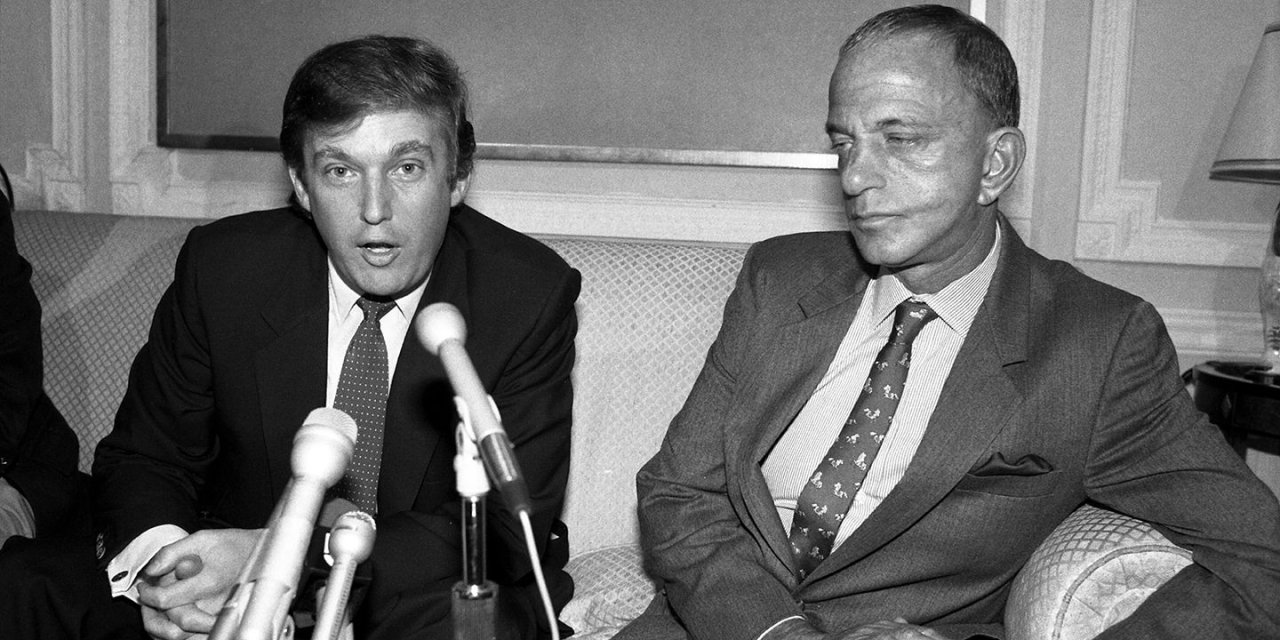 Donald Trump, left, owner of the now-defunct USFL's New Jersey Generals, said his league’s $1.32 billion antitrust suit against the NFL will crack “one of the great monopolies in the is country.” At right is his attorney Roy Cohn. Bettmann Archive/Getty
Donald Trump, left, owner of the now-defunct USFL's New Jersey Generals, said his league’s $1.32 billion antitrust suit against the NFL will crack “one of the great monopolies in the is country.” At right is his attorney Roy Cohn. Bettmann Archive/GettyOn a rainy day in the spring of 1976, FBI Special Agent Myron Fuller took the New York subway to Brooklyn to interview Donald Trump. The future tycoon, about 30, was just getting his real estate career off the ground, aided by secret payments from his father. Fuller found Trump working out of a temporary office in a double-wide trailer on a muddy construction site. "There were boards covering wet dirt, in lieu of cement walkways," Fuller recalls to Newsweek. He knocked on the door and went in. "His secretary sat there by the entrance, and Trump was a door away from there." Ushered in, he found Trump sitting behind his desk. The businessman did not get up to welcome the agent. "He never came around, and I do not recall him shaking my hand," Fuller says.
The FBI agent was carrying out an errand for the bureau's Miami office, to follow up on a tip that mobsters had asked Trump to front for them in a purchase of the Fontainebleau hotel. Once a beachside favorite of movie stars and the rich, the hotel was also a notorious hangout for Mafia kingpins like Sam Giancana, who famously met with CIA agents in the hotel's Boom Boom Room to plot the assassination of Fidel Castro. But in 1976, the Fontainebleau was teetering on bankruptcy, and the mobsters needed a straw man to buy it.
Fuller asked Trump a simple question. "Why would your name come up as a possible buyer for them?" The future president of the United States responded calmly that "he did not know." He had "heard about" some people wanting him to buy it, he told Fuller, but not much more. Fuller, with nothing else to go on, closed his notebook. Trump summoned his limo driver to take the agent back to the city.
More than 40 years later, Fuller, who gained fame for the FBI bribery sting dramatized in the movie American Hustle, chuckles ruefully about the encounter, reported here for the first time. "Seeing who he is now, learning more about him in the last two or three years, I do have some regrets that I didn't have a bell and whistle going off there and go further," he says.
And nothing further did connect Trump to the Fontainebleau's eventual sale to a mob front. Nor do public records show the budding real estate operator was ever indicted, much less convicted, in any of the big cases that brought down the five Mafia families who ruled New York. But Fuller's encounter offers a timely window into a history that explains how Trump learned to talk—and act—like a don, even in the hallowed precincts of the White House.
To be sure, Trump's upbringing in Queens, where the Mafia was ubiquitous, helped form his wiseguy persona. So did an apparent behavioral disorder that caused him to buy switchblades and start fights in school. But it's also evident that by the time he was 30, the future president was on the FBI's radar as someone the Mafia might turn to in a pinch. And by the time he was 70, with a business trajectory studded with mobsters, it should've come as no surprise that he was paying hush money to women, allegedly offering a secret hotel deal to Vladimir Putin, calling his longtime former lawyer Michael Cohen a "rat" or denouncing prosecutors for pressuring his associates to "flip."
This was the life he had chosen.
In December, as the president disparaged Cohen with Mafia lingo (the onetime fixer told a federal court that Trump had directed him in violating campaign finance law), a flurry of coverage noted the origins of rat and how Trump had used it before, along with flip, more wiseguy slang for cooperating with the feds. The press clutched its collective pearls. But lost in the horror over Trump's language were the much darker inflection points of his journey through the underworld, relationships arguably more revealing about the president and his business and political operations than still-unproven theories about his collusion with Russian interference in the 2016 election.
Going to the Dark Side
Trump's descent into the gangland may have begun with Roy Cohn, the ruthless lawyer whom Trump hired to help navigate the bare-knuckle New York real estate business. Long notorious for helping Senator Joseph McCarthy unleash the 1950s "red scare" that ruined the careers of scores of Hollywood figures, federal workers and journalists, Cohn in the 1970s represented leaders of the Vito Genovese crime family during a federal racketeering investigation. As it turns out, around the same time Fuller was interviewing Trump in 1976, Cohn was adding a former Connecticut attorney general to his law firm who, on the side, was representing a local mobster by the name of Andrew D'Amato in a bid to buy the Fontainebleau.
Looking back on the events years later, Fuller says, "I presume that Miami's knowledge of D'Amato's efforts to purchase the Fontainebleau hotel is what led them to Trump." In 1977, D'Amato was convicted of conspiracy in a financial swindling scheme in Hawaii with other known mobsters. Now in his 90s, D'Amato did not respond to messages left at his home in Connecticut.
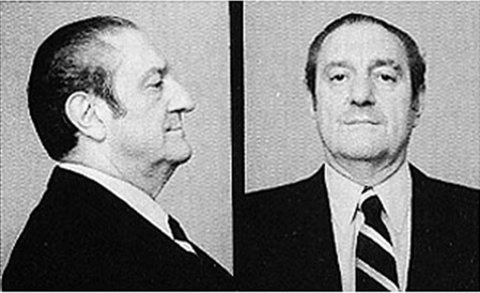 Paul Castellano mugshot from 1985. FBI/Getty
Paul Castellano mugshot from 1985. FBI/GettySome of Cohn's Mafia clients controlled New York's construction unions, whose blessings Trump needed to complete his projects. So he "hired mobbed-up firms to erect Trump Tower and his Trump Plaza apartment building in Manhattan, including buying ostensibly overpriced concrete from a company controlled by Mafia chieftains Anthony 'Fat Tony' Salerno and Paul Castellano," Pulitzer Prize winner David Cay Johnston wrote in Politico in 2016. Village Voice investigative reporter Wayne Barrett, who chronicled Trump's deals in books and articles through the years, wrote that Trump probably met Fat Tony through Cohn. "This came at a time when other developers in New York were pleading with the FBI to free them of mob control of the concrete business," Johnston wrote.
One benefit of such connections was that workers tearing down the Bonwit Teller building where Trump Tower was planned could take allegedly illegal shortcuts around strict city regulations for disposing of construction waste. According to a Newsweek source who asked not to be identified because his family is well-known in the construction business, the asbestos and concrete were dumped near abandoned docks in Brooklyn and other discrete places instead of prescribed sites farther away—saving time and money. The White House referred Newsweek to the Trump Organization, which did not respond to an inquiry.
"On paper," as one of several news accounts put it, the demolition workers were members of Local 95, a Genovese-controlled union. But in reality, they were undocumented workers from Poland and South Korea. Ronald Fino, son of a Buffalo, New York, Mafia capo, told Newsweek they were known as "the sneaker brigade" for "remov[ing] the asbestos illegally." (Through the years, Trump denied knowing about the illegal workers, but in 1998, after years of litigation, he quietly paid a total of $1.38 million "to settle the case, with $500,000 of it going to a union benefits fund and the rest to pay lawyers' fees and expenses," The New York Times revealed in 2017.)
"New York was so totally corrupt and so controlled by the mob in the '80s that in order to be a successful businessman, you had to have some way to work that world," former FBI agent Walt Stowe, who grew close to Trump through the years and says he never saw the developer do anything illegal, told The Washington Post's Robert O'Harrow Jr. in 2016. But by 1988, Trump was feeling so comfortable associating with Mafiosi that he did his first name-licensing deal with a luxury limo rental company owned by John Staluppi, a made member of the Colombo crime family, according to William Bastone, founding editor of The Smoking Gun website. And by that time, Trump was deep into his quest for an Atlantic City fortune.
But early on, Trump relied on his associations with underworld characters to open his grandiose (and ultimately bankrupt) gambling dens on the boardwalk. One of the more interesting characters back then was Daniel Sullivan, "a 42-year-old giant of a man with great charm and a criminal record," who "dealt with labor problems at Trump's construction sites," according to O'Harrow's deep-dive story. Trump went into a drywall manufacturing business with Sullivan, which was "among the firms implicated in a racketeering scheme involving the carpenters' union and the Genovese crime family" represented by Cohn, O'Harrow wrote. Sullivan also brought Trump into an Atlantic City land-leasing deal with Kenneth Shapiro, whom law enforcement authorities had identified as a financier and agent for Philadelphia mobster Nicodemo "Little Nicky" Scarfo.
Advised by the head of New Jersey's Gaming Enforcement agency that the Sullivan connection could hurt his chances for casino licenses, Trump bought him out and told the FBI that he was severing all ties with the big guy. But they stayed in touch, according to a 1983 civil suit Sullivan filed against New Jersey authorities: At one point, Trump offered him a job as his organization's chief labor negotiator, with a $75,000 salary, he swore in court documents. In the end, no evidence has surfaced showing Trump was ever charged in any Mafia-related probes.
The Snitch?
Former law enforcement officials say Trump had a close and curious relationship with the New York division of the FBI. Former FBI Special Agent Mark Rossini tells Newsweek that Trump was frequently seen in the bureau's New York offices and may have been a "hip-pocket source" for James Kallstrom, a wiretapping expert who supervised Mafia investigations in New York, and Rudy Giuliani, the top federal prosecutor in Manhattan who would later become mayor of New York and, eventually, Trump's personal lawyer amid the "Russiagate" probe. (Kallstrom denied that Trump was a source. Giuliani did not respond to a request for comment.) Rossini wonders whether Trump's cultivation of FBI agents protected him in the Mafia probes. "All the construction unions were mobbed up" in the 1980s, Rossini noted. "How did he deal with the mob all these years and never appear before a grand jury?" Fuller also thinks "Trump was an informant for somebody in the FBI New York office."
But Bruce Mouw, who headed the New York FBI's investigation into the Gambino crime family, dismisses insinuations that Trump was either a mob asset or confidential bureau source. "I don't believe it," he tells Newsweek. Contacts with mobbed-up union chiefs, he says, "were done through the construction companies, not the developers."
But a remark Trump himself made at an event years later suggested he was well placed to share tips on Mafia personalities with favored FBI officials. During the height of his fame as star of The Apprentice, Trump claimed that "every network" tried to get him to do a reality show, but he refused.
"I don't want to have cameras all over my office, dealing with contractors, politicians, mobsters and everyone else I have to deal with in my business," he told a 2004 panel at the Museum of Television and Radio in L.A. "You know, mobsters don't like, as they are talking to me, having cameras all over the room. It would play well on television, but it doesn't play well with them."
What's clear is that Kallstrom, a former Marine, grew close to Trump over the years. The real estate developer donated over $230,000 to Kallstrom's Marine Corps–Law Enforcement Foundation and provided it free space in his Atlantic City casinos for fundraisers, according to several accounts. Kallstrom's foundation, in which Rush Limbaugh is a director, was also "the single biggest beneficiary of Trump's promise to raise millions for veterans" in a lead-up to the 2016 Iowa Republican debate, Barrett wrote. "A foundation official said that Trump's million-dollar donation this May, atop $100,000 that he'd given in March, were the biggest individual grants it had ever received."
Kallstrom became an influential Trump defender and Hillary Clinton critic during the 2016 campaign, bashing then–FBI Director James Comey for failing to nail Clinton on her private email server and accusing Obama administration officials of committing "perjury" in their pursuit of Russian ties to Trump and his associates. In March 2018, he went further, accusing Comey and disgraced former FBI counterintelligence chief Peter Strzok of having "a backup plan to frame Donald Trump" as a Russian agent.
Neither federal prosecutors nor U.S. intelligence officials have reported evidence of any "plot to frame Trump." To the contrary, former FBI Director Robert Mueller was appointed special counsel to investigate alleged Russian plotting to tilt the election to Trump—with the candidate's knowledge and approval. One of Mueller's subjects of interest has been a now-infamous 2016 meeting that Trump's son Donald Jr., then–campaign chief Paul Manafort and son-in-law Jared Kushner eagerly took with a Russian agent offering "dirt" on Clinton.
Russia's intelligence services, oligarchs and gangsters are seamlessly connected, according to multiple news accounts through the years. And since the collapse of the Soviet Union in 1991, the Russian mob has made huge inroads into the American underworld, sometimes forming alliances of convenience with La Cosa Nostra. As a teenager, Trump's future lawyer Cohen, The Wall Street Journal reported last year, "frequented Brooklyn's ethnic Russian neighborhoods and married into a Ukrainian family." At a friend's wedding, he "bragged to another guest that he belonged to the Russian mob." The friend didn't believe it, but when Trump pursued a hotel deal in Moscow, Cohen was dispatched to seal the deal, working through shady characters to offer Putin a top-floor penthouse, according to BuzzFeed News.
The Trump Organization had long been awash in illicit Russian money, author Craig Unger claimed in a 2018 book, House of Trump, House of Putin: The Untold Story of Donald Trump and the Russian Mafia. "It started out as a simple money-laundering operation at Trump Tower in 1984, when a Russian mobster came to Trump Tower with $6 million in cash and bought five condos. This is the template for what begins to unfold. At least 1,300 Trump condos in the United States have been sold similarly. All cash purchases through anonymous sources," Unger told Newsweek last August.
Russian mafia expert Mark Galeotti says it's all about greed. "I have seen no serious evidence of any explicit link between Trump and Russian mobsters. Rather, what I have seen is evidence of the extent to which the Trump Organization seems to have been willing to engage with dubious investors and buyers—some Russian, many not—whom more reputable corporations would not have touched," Galeotti recently told Vice.
That seemed the case all the way back in 1976, when Trump calmly told FBI agent Fuller that he had "heard about" a pitch for him to buy the notoriously mob-connected Fontainebleau hotel. There was no shock in his response, no indignation that the FBI would present him with such an allegation. Fuller thinks back to that moment in the construction site trailer, and he wonders how history might have taken a different course if he or someone else in the FBI had kept a more critical eye on Trump.
"At that time, the only people who were interested in buying the Fontainebleau were the mob," he says. "Had I been a little bit sharper, I think I might've—well, it might've been a direction we could have gone."
Update: Former FBI agent Mark Rossini implied in a previous version of this story that he had personally seen Trump in the FBI's New York office. Following the story's publication, Rossini contacted Newsweek to clarify that he had not personally witnessed Trump in the bureau's office, though others had.
Episode transcript

Revisiting the 2016 ‘October Surprise’
���Martine Powers:From the newsroom of The Washington Post, this is "Post Reports." I'm Martine Powers. It's Tuesday, September 29th. Today, the story behind the FBI's October Surprise. The cost of ordering online. And one more thing.
Devlin Barrett:October Surprise basically means a last-minute revelation that might scramble the race, change the polling numbers, and give the candidate very little time to react or adjust to whatever the revelation is.
Henry Kissinger:We believe that peace is at hand.
Bill Clinton:Today's disclosure that President Bush knew and approved of the arms for hostages deal with Iran not only directly contradicts the president's claims, it diminishes the credibility of the presidency.
George W. Bush:Obviously, there's a report out tonight that 24 years ago, I was apprehended in Kennebunkport, Maine, for a D.U.I. I think that's an interesting question -- Why now, four days before an election?
Reporter:Governor...
Devlin Barrett:My name is Devlin Barrett, and I cover the FBI and Justice Department for The Washington Post.
Martine Powers:In the last few decades, it seems like, almost without fail, something insane happened just weeks or even days before the election.
Devlin Barrett:Right. And then you get to 2016.
Hillary Clinton:I have now seen Director Comey's letter to Congress. We are 11 days out from perhaps the most important national election of our lifetimes.
Martine Powers:Devlin has been working on a new book about what you might call the mother of all October Surprises.
Devlin Barrett:On October 28th, 11 days before the election, the FBI director at the time, James Comey, announced that he was reopening the Clinton e-mail investigation because of e-mails found. Although he didn't say it at the time, they were found on a laptop belonging to the former congressman Anthony Weiner.
Donald Trump:The FBI has just sent a letter to Congress informing them that they have discovered new e-mails pertaining to the former secretary of state Hillary Clinton's investigation.
Devlin Barrett:So, the FBI investigation of her use of a private e-mail server while secretary of state had really dogged and shadowed and just hung over her campaign all through her bid for the president in 2016. But then, in July, the FBI director publicly announced that he was shutting down the investigation because they had not found enough evidence to charge anyone with a crime. So, in October, by the time you get to October, everyone thinks the e-mail investigation is basically dead, as far as the FBI is concerned, but this suddenly opens it back up, and there's suddenly this prospect of, "Well, wait. Maybe the Democratic candidate for president really is in legal trouble." And what you saw in the polling, she was leading by about 6 percentage points before that letter, and after the letter, she was leading by about 3. Now, 3 is still a lead, right? But the challenge of a 3-point lead is that a 3-point lead is basically within the margin of error, meaning she is no longer in a comfortable position, particularly when it comes to the battleground states that were going to decide that election.
Martine Powers:So, why did you decide to go back to this moment and understand more of what was going on behind the scenes?
Devlin Barrett:You know, I have covered the FBI and the Justice Department for a long time and I just have never seen anything like what happened in 2016. And I think, frankly, most FBI and DOJ reporters would say the same, that the sequence of events that occurred in 2016 was just so unusual for the FBI and for the Justice Department. And I really felt that as much as people argued about it, as much as people agreed that the FBI's role was important, I often felt, as a reporter who covers this topic, that a lot of people didn't necessarily understand how it had gone down inside the FBI. I think it's important for people to understand what did and didn't happen inside the FBI that year, because I think, in a lot of ways, both the country and the FBI are still dealing with the consequences of Comey's decision.
Martine Powers:Hmm. So, where does that story start, this untold story of how this part of the investigation ended up coming out just days before the election?
Devlin Barrett:So, what happens is that in July of 2016, the FBI director announces, at a press conference, that he's closing the Clinton e-mail investigation.
James Comey:Good morning.
Devlin Barrett:That's obviously a big moment for both campaigns.
James Comey:We cannot find a case that would support bringing criminal charges on these facts.
Devlin Barrett:And then, in September of 2016, an FBI special agent named John Robertson is working on sex crimes in New York, and he gets the Anthony Weiner case. And the Anthony Weiner case is basically investigating whether this former congressman broke any laws by sending sexual messages to a 15-year-old girl in another state. But he comes across what seemed to him to be like huge volumes of e-mails to and from Hillary Clinton. And that's because Anthony Weiner was married to a woman named Huma Abedin. And Huma Abedin is one of Hillary Clinton's longtime close aides. Her in-box had basically been downloaded onto Anthony Weiner's laptop. The agent finds these e-mails on this laptop, knows that's not what his search warrant tells him to look for, but also knows that this could be a huge potential problem.
Martine Powers:So, then what does he do?
Devlin Barrett:So, he does what most agents would do, which is tell his boss, and he sort of expects that to create a huge, you know, commotion inside the FBI and that people will respond quickly and start investigating this. Instead, what happens is total silence. And it's total silence, but with some added complications, in that one of his bosses orders him to wipe his workstation while he's still waiting to hear back what they want to do about all these Clinton e-mails.
Martine Powers:Why do they ask for him to do that?
Devlin Barrett:The boss's argument was, "Look, we know that there are some classified material among Clinton's e-mails." Just generally speaking, that was what the old investigation had found. "You, Agent John Robertson, shouldn't be holding on to any classified material, so I just want you to wipe your workstation." That's a reasonable, I guess, logical way to approach things, unless you're John Robertson, because, at that point, the special agent starts thinking, "Well, what happens when someone asks me what I did with these files? Because I won't be able to show them, because my workstation will have been wiped. I mean, I can tell them, and hopefully they'll take my word for it, but do I know that?" So he starts worrying, if this becomes a political problem for the FBI down the road, it will just be him that takes the blame.
Martine Powers:So, then what does he do next?
Devlin Barrett:He starts talking about like, "Maybe I should go tell someone. I mean, if my own chain of command won't tell anyone, maybe I need to tell someone outside about what's happening so that someone will do something." And at that point, the prosecutors get alarmed. They worry that he's, you know, contemplating taking steps that would blow up his career. The two prosecutors take the issue to their boss and say, "Look, this agent seems to be really unhappy and really upset and really concerned. So I think we should raise this with folks in Washington and see what's going on," which they do. And while the agent doesn't really know this for a little while, that actually breaks a sort of bureaucratic inertia that was going on in this before. So then things start moving.
Martine Powers:And how do they start moving?
Devlin Barrett:The FBI in Washington starts asking questions and starts trying to figure out, "Okay, what do we need to do to look at these e-mails, because they were obtained for a different investigation." And, so, they brief the FBI director, James Comey, about what they think is on the laptop. And James Comey makes two decisions which are hugely important to the election. One is that he decides, "Yeah, we need to reopen this investigation." And, in some ways, more importantly, two, he decides, "We need to tell Congress right away that we're reopening this investigation."
Martine Powers:And, so, he's thinking at this time -- or at least what we know of his thinking at this time -- is that he feels like he needs to tell Congress because he doesn't want it to appear that he's sitting on this information or trying to prevent it from coming out that they are looking at the Clinton e-mails again.
Devlin Barrett:Right. At that point, the FBI starts worrying about, "What will people say about us if they find out that we knew this and didn't say anything before the election? Will we, the FBI, be accused of helping Hillary Clinton get elected?" And that was a very alarming prospect to Comey and the others in the room. Importantly, the prospect they didn't consider was whether or not Trump could win. They really didn't think there was much chance of Trump winning the election. They didn't believe that was -- there was much risk of that. But Comey also felt like, "Well, you know, we really shouldn't consider who might win. We should just not consider possible outcomes." But, obviously, a decision like this, an issue like this is going to have some effect on the outcome.
Martine Powers:So, looking at this timeline in its totality, what do you think is the part that something could have gone differently that would have changed the outcome of what Comey decided to do and what the ramifications were for reopening this investigation?
Devlin Barrett:So, in the "woulda, coulda, shoulda" category, the most obvious one is when Special Agent Robertson first raises this question in late September of 2016, if they had just done the investigative steps that they ended up doing instead in late October, they would have had their answer in early October, maybe the first or second week of October, and they would have known at that point, "Oh, well, you know what? We found some new e-mails, but they don't really change our understanding of anything." And at that point, in theory, even if you made an announcement, it probably would not have been that seismic, because what you would really be doing is saying, "Yeah, we found something new, we looked at it, but it turned out not to be much of anything." I'm not saying that would be a nothing announcement, but it would not be the sort of earthquake that hit the election 11 days out.
Martine Powers:So, now that we have a better picture of what was happening behind the scenes that created the circumstances the way that they did, what do you think is the lesson that's learned from here or, like, the takeaway of what was really the thing that went wrong here?
Devlin Barrett:One person has described Comey's letter as essentially opening Pandora's box, because what it really did was, it really showed how much of an effect the FBI and the Justice Department can have on an election if they choose to do something in late October. And what a lot of folks have been trying to figure out is, "How do you go back to a place where government agencies, especially one like the Justice Department or like the FBI, are just not that central in political campaigns, are just not playing such a front-and-center role?" And that is what a lot of senior officials have spent a good chunk of this year trying to do, trying to keep the FBI essentially out of the election this year. But one of the challenges is, because of the events of 2016, a lot of folks are trying to draw them into it and sort of re-create another October Surprise if they can. I think the bureau is trying very hard to get out of the way of the election. But the larger issue is that, you know, once you inject this level of sort of partisan suspicion and expectation almost of an October Surprise, those things can become a self-fulfilling prophecy if you let them. And so I think there's a lot of folks who are bracing for some kind of October Surprise, not really knowing if it's going to happen or not, but just essentially still wary of what happened in 2016.
Martine Powers:Devlin Barrett covers the FBI and the Justice Department for The Post. His new book is out now. It's called "October Surprise: How the FBI Tried to Save Itself and Crashed an Election."
Abha Bhattarai:When the shutdown started in March, we saw a massive increase in online orders.
Robyn Smith:We were unprepared, I would say, because of the volume that was to come.
| ||||||||||||||||||||||||||||||||||||||||||||||||||||||
Charles McGonigal has to tell the American People the absolute truth, and he should be given any incentive to do it. This is his ultimate responsibility.
https://t.co/YmKSfLhHdp
"Did Comey ever investigate leaks from bureau to Giuliani and Kallstrom? What did he learn about their contacts and activities? Did he take any action when he heard their televised claims ..."
Joe Conason column: A few hard questions for Comey pressconnects.com/story/opinion/… https://t.co/uK9KfJd4YW
It would take just one person to insert the Clinton emails into the Abedin-Weiner laptop, and it could be Charles #McGonigal, at James #Kallstrom's and the other PLOTTERS request.
He was in the unique position to do that, and then to pass the laptop to others.
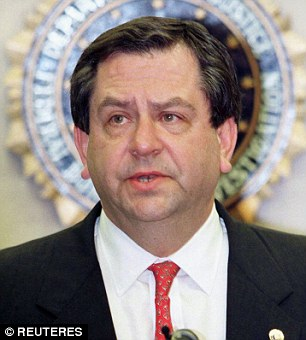
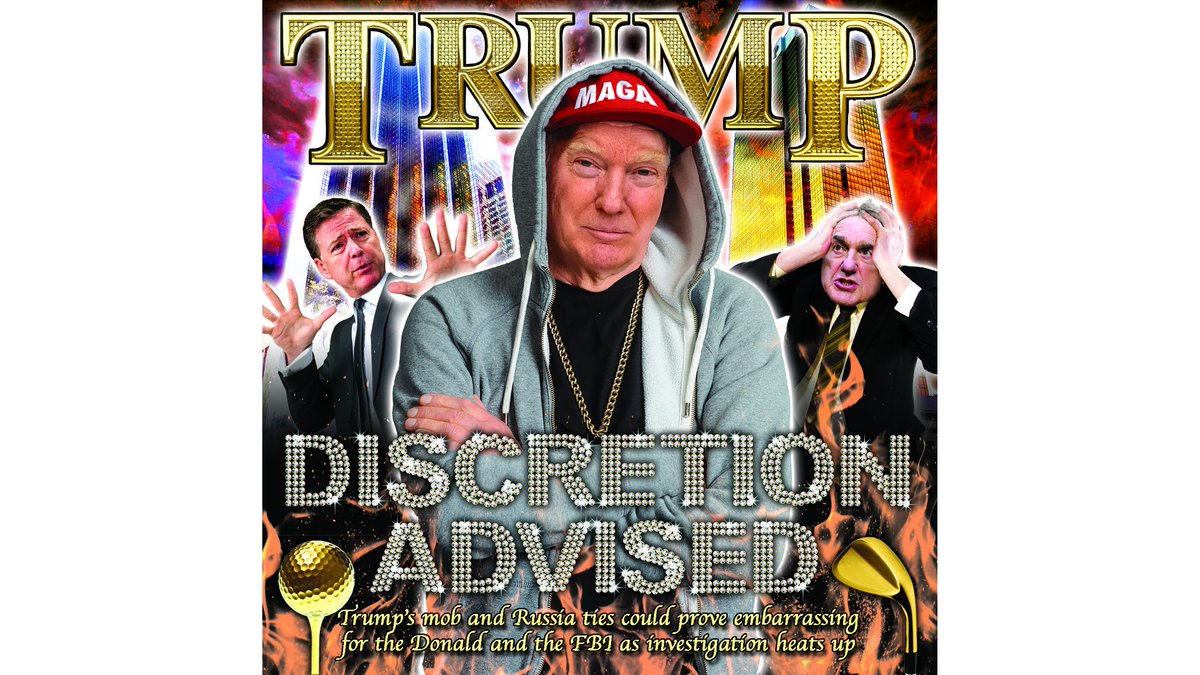
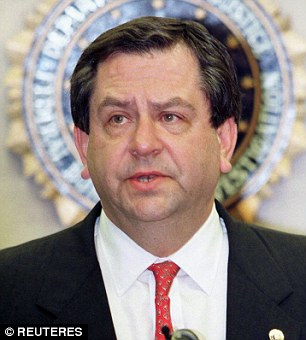
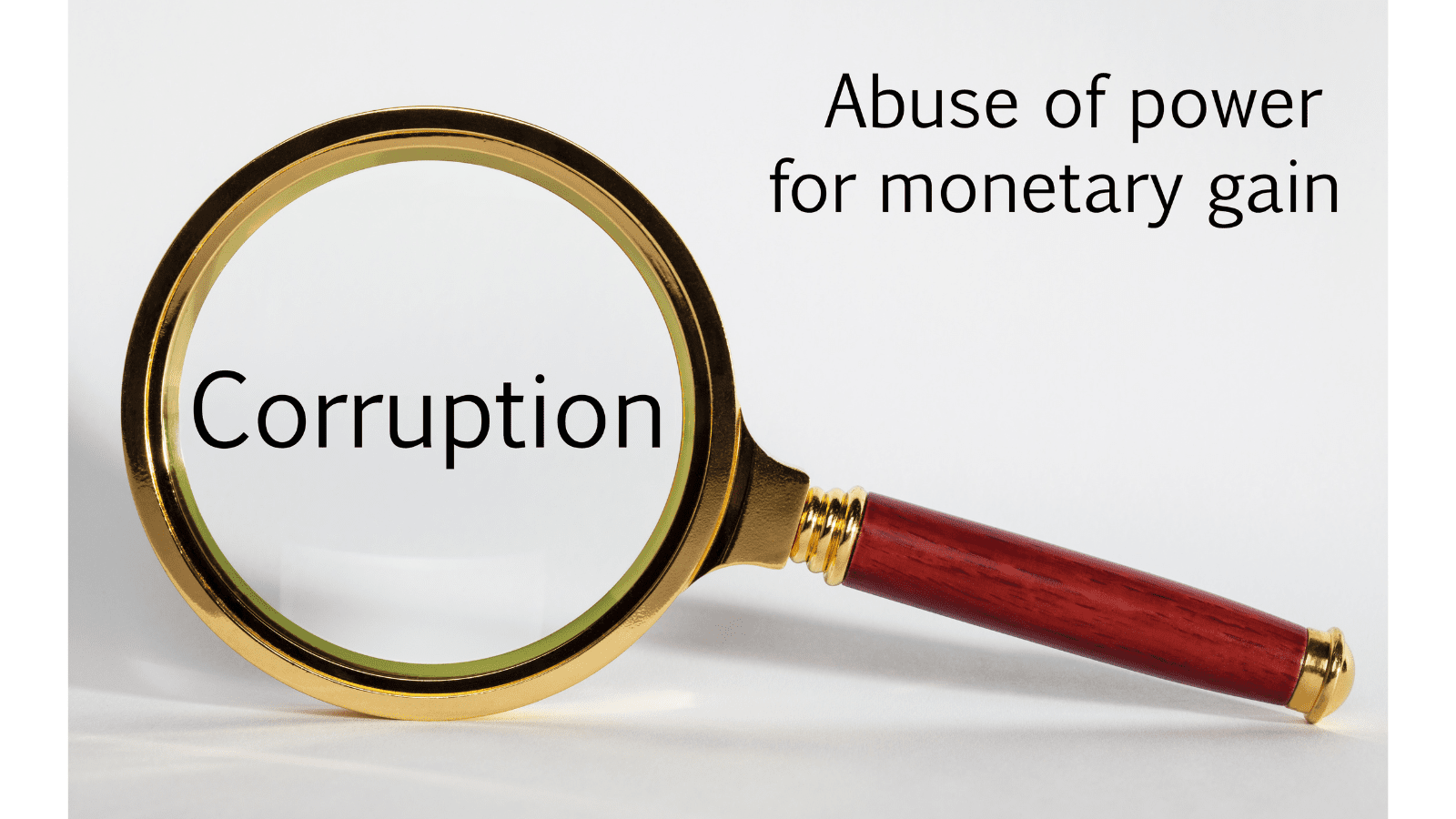
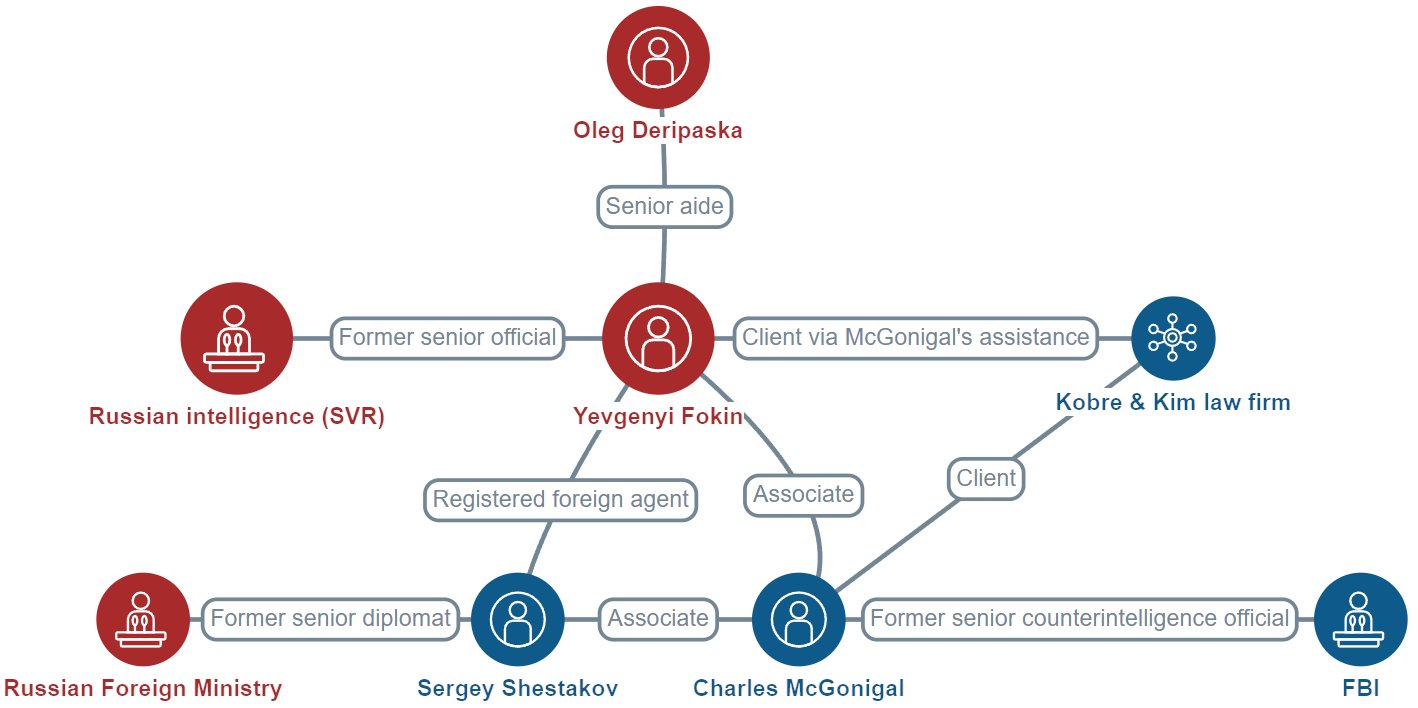
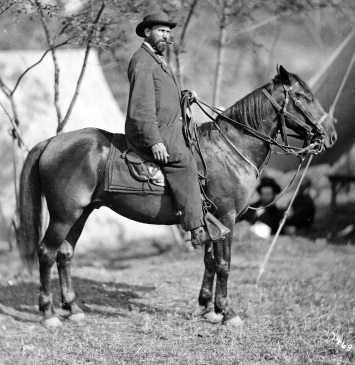
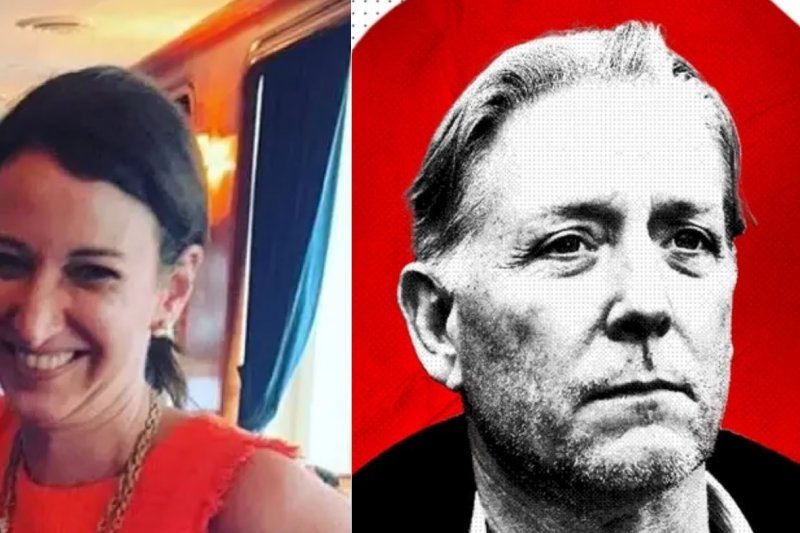
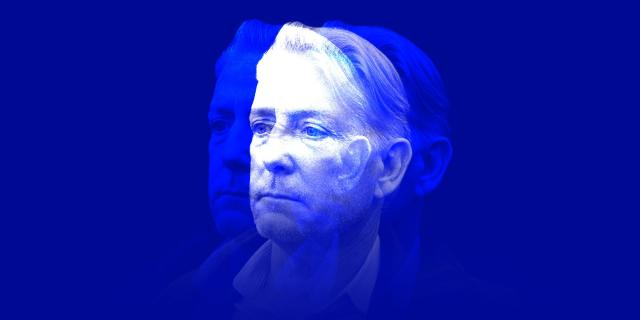


Comments
Post a Comment